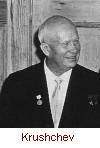|
|
|
Muhammad Daud becomes prime minister of Afghanistan. He begins to modernise the country and receive military and economic aid from the Soviet Union. Relations with the Pathan tribes of Pakistan deteriorates.
King Sihanouk successfully negotiates for Cambodia's independence from the French.
Following the death of Stalin, the Czechoslovakian government permits a mild liberalisation of conditions.
After the death of Stalin, the Hungarian government liberalises some of its policies. Political prisoners are granted amnesty and labour camps are abolished.
Laos gains full sovereignty and becomes a member of the United Nations. The new nation faces civil war as Pathet Lao guerrilla forces continue attacking central Laos.
After the death of Stalin, Romania begins to assert its independence from the Soviet Union.
 Joseph Stalin dies. Major changes follow. Soviet citizens are granted a greater degree of personal freedom, although still within the bounds of Communist ideology.
Joseph Stalin dies. Major changes follow. Soviet citizens are granted a greater degree of personal freedom, although still within the bounds of Communist ideology.
Telegram from China to the USSR on Stalin's Death.
How Moscow broke the news of Stalin's death to the people.
After continued fighting, an armistice is declared and signed. The Korean War ends. A Demilitarized Zone remains at the 38th parallel.
The Soviet Union explodes a hydrogen bomb.
Read about Andrei Sakharov, the father of the hydrogen bomb.
 Nikita Khrushchev becomes leader of the Soviet Union.
Nikita Khrushchev becomes leader of the Soviet Union.
See more pictures of Nikita Khurushchev.
Listen to excerpts from Khrushchev's speeches.
|




 Joseph Stalin dies. Major changes follow. Soviet citizens are granted a greater degree of personal freedom, although still within the bounds of Communist ideology.
Joseph Stalin dies. Major changes follow. Soviet citizens are granted a greater degree of personal freedom, although still within the bounds of Communist ideology. Nikita Khrushchev becomes leader of the Soviet Union.
Nikita Khrushchev becomes leader of the Soviet Union.